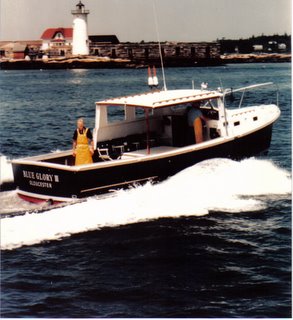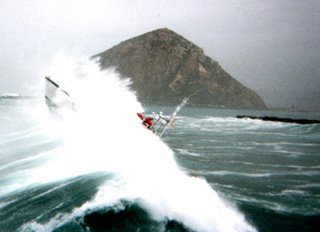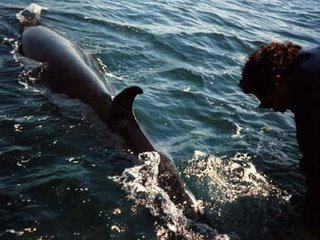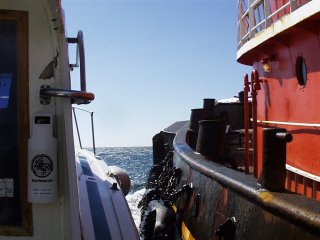
(Originally published in
Offshore magazine under the title "Liar's Logbook." Artwork by David Stickney.)
This story really happened. I deliberately changed the names and pretended it was all a hoax for the simple reason I never thought anyone would believe me. You probably still won't believe it, but I swear it's true.
**
It was one of those screamin' August days. Wind whipping up a fierce sea. Tail of a hurricane. Long Island Sound looking like the inside of a Maytag on power wash. No day for man, fish, or fisherman. (And yes, I'm deliberately differentiating between man and fisher
man.)
I had a charter. They drove all the way from somewhere inland of the Tappan Zee Bridge to meet me at Ray's Marina on City Island. This is 30 plus years ago, long before cell phones, which is why I couldn't get in touch with them to cancel. You'd think with storm warnings posted and the ban on tractor-trailer and van traffic on the bridge they would've figured it out themselves. Apparently, that was too much to expect.
Mike and Pete came for bluefish. They had in their arsenal 30 pound rods and reels and a dozen or more absurd-looking plugs and spinners. I had similar gear (less the Dayglow lures) as I anticipated blues and stripers and nothing else, i.e. flounder, blackfish, etc. The rest of my stuff I had left at home.
I was hoping they'd make the trip home with my apologies and their deposit but it didn't work out that way. They wanted to stay and fish from the dock. Mike had been waiting three weeks for this and needed to dip a hook in the worst way, even it was only from the end of the float. Unfortunately, with their heavy gear, and mine, fishing from the dock with our rods and reels was going to be like taking a shotgun to a spitball contest.
Enter Sal . . . fisherman extraordinaire, long time City Islander, geezer with the golden gift. Sal had a brand new $290 light tackle custom rod and reel he had just purchased. This was no ordinary stick. It was a piece of art.
As both our boats, Sal's and mine, shared a common float, it wasn't long before all of us were sharing tall tales of rowdy bars, sex starved women and even sexier fish. In no time at all, Mike and Sal had hit it off.
Now I'm not saying Mike had an ulterior motive, but it didn't take him long to talk Sal into loaning out that $290 rod and reel.
"Come on," Mike said. "I'll be careful. What could happen inside the harbor? There's nothing here but small flounder and green crabs."
"You never know," said Sal.
"I'll take the can of flatworms and cut tiny chunks, just the tiniest pieces of bait, less than the size of my pinky nail. What the hell's gonna grab it but a crab or a tiny flounder? And I'll take care of the rod, I promise."
Sal looked at his new rig and then at Mike. "Well, all right," he said, "but don't dip the tip in the water and don;t walk away from it. Hold it in your hands at all times. It wouldn't be the first time a rod was pulled in the water by a fish."
Mike accepted the rod from Sal, grabbed the number 10 can full of flatworms, and walked to the end of the dock. He sat down and began cutting bait. Within minutes he was happily fishing. There were nibbles, a modest strike, then a small flounder. He brought up a couple of crabs, then another small flounder. An hour had passed. Now he had to use the head.
He cut a small piece of bait, the size of his pinky nail, as he promised, baited the hook, and cast it about fifteen feet from the dock. He then laid the stick on the tackle box and gently wedged the butt end of the rod into one of the dock cleats. This will only take a minute, he thought.
Mike walked back to the dock house, but just as he passed Sal's boat and mine, Sal stopped him. "How's it going," he asked.
"Two small flounder," said Mike. "I'm going to the head. Be right back."
"Where's my rod and reel?"
"I left it there. I'll only be a minute."
Sal was peeved. "What??!! You left it there. I thought we had a deal. Someone could step on it, knock it into the water. Forget it. I changed my mind. You can't use it. I'm taking it back."
"OK, OK, hold your horses, Sal. I'm sorry." Mike backpedaled. "I'll go back and get it and bring it to you."
"HEY BUDDY," hollered someone from the end of the dock, "YOU GOTTA FISH ON!"
Mike looked at Sal. Sal glowered at Mike. Then Mike, Sal, Pete and I ran for the end of the dock. We got there just in time to see the rod wiggle free from the cleat and go sailing tip first into the harbor. But it didn't sink. The force with which it was being towed kept it on the surface for at about ten seconds. In that time, it looked like a torpedo speeding through the water. Sal's $150 reel threw a beautiful rooster tail about a foot high. Then the whole thing went under tip first and disappeared. It was quite a show.
Needless to say, Sal was not happy. He laid into Mike with a vengeance.
It was up to me to make peace.
"Sal, we can get it back," I said.
"Forget it," Sal said. "It's gone." He lowered his head and stared at nothing. He was defeated.
"I have a grapnel," I said. "We'll take the skiff and the grapnel and tow it around out there, you know, in the area we saw the rod go down. Really, Sal, how far can that fish tow that rod?
"I'm sure the line will break first, but what the hell? Let's go."
Sal and I boarded the skiff and rowed out to where the rod sank. We towing the bottom for about five minutes. Then Sal said he had something.
"Pull it up," I said.
Sal yanked at it, straining. "It's too heavy. Give me a hand."
We both hauled on the grapnel line knowing full well whatever we were pulling in was not what we were looking for. "I better not lose my grapnel," I said.
Sal shot me a look, saying with his eyes that he thought my grapnel was not on a par with his $290 stick that my charterer foolishly sent into the drink.
"Here it comes," said Sal. "It's almost here. I got it. I got it. Damn! What the hell is it?"
"It's an underwater cable, you idiot. Get my grapnel off of it and let it go. You wanna get electrocuted or something?"
"No, wait," said Sal. "Look. It's mono. One end goes that way. The other end goes over there." Sal carefully unwound some of the line from the submarine cable like a surgeon removing stitches.
"Oh crap," Sal said with the line in his hand. "There's a fish on here."
Sal played the line with the expertise of a master fisherman. After 10 minutes of gentle persuasion, the head of a very tired 25" striper broke the surface.
While Sal lifted the fish into the skiff, I pulled at the other end of the line. A minute later the tip of a fishing rod covered in jet black mud poked into view. I cut the line and handed Sal the rod. "Here you go," I said, proudly. "I told you we'd find it."
Sal smiled and took the rod. He cleaned off the reel with his hand and was staring at it when he spoke: "Guess what?" he said.
"What?"
"This ain't my rod."
ARE WE SINKING ... OR ARE MY LEGS GETTING SHORTER?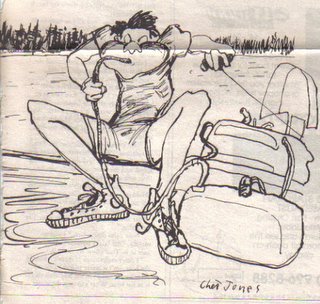 (by Bob Bernstein, originally published in Offshore Magazine. Illustrated by Chet Jones.)
(by Bob Bernstein, originally published in Offshore Magazine. Illustrated by Chet Jones.)
It happened on a lake in Central Maine in the summer of 1969. I was 16 and had been hired as the new water skiing instructor for Camp Webago. Never mind that I didn't know how to water ski. The Director assured me I would know enough by the time the kids arrived. He was right, but that's another story.
I was in charge of two boats, a 17' MFG with a 65 hp Johnson, and a 16' Glastron with a 55 hp, four-stroke Bearcat. They don't make the Bearcat anymore, and for good reason. The old Bearcat was way ahead of its time -- a good idea backed by something less than perfect engineering. It was a high-concept outboard with a few problems, among them a tendency to overheat.
The director took me to the waterfront and left me with the two boats, both beached and full of rainwater. I decided to tend to the Glastron first. I climbed aboard, dropped the lower unit into the water, and turned the key. The engine spurted to life -- and I do mean 'spurt'; a little rubber nozzle under the bonnet was the key to proper engine performance. As long as water flowed unimpeded through the nozzle, the engine ran fine. However, as soon as dirt or air clogged the nozzle, the motor would overheat, sputter, cough, rattle, and die. Fortunately, it didn't take me long to figure out that the problem could be corrected by oral siphoning of the nozzle. After several breathless minutes of alternately blowing and sucking on the nozzle, I had the beast running smoothly.
Before heading out on the lake to drain the boat I did two things. First, I boarded the MFG and started the Johnson. I let it run a few minutes, then shut it off and pocketed the key. Second, I went into the dining room to shanghai a couple volunteers to help push the Glastron off the beach; the boat had a double hull and full of water it was heavy as a tank.
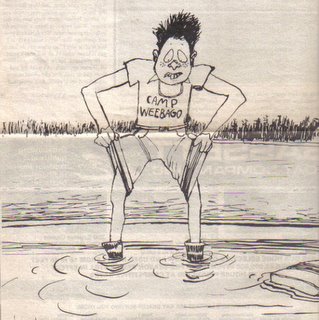
I found half a dozen counselors drinking coffee at one of the tables, but only one expressed an interest in coming along. Ken, a thick-set, blond-haired, die-hard Yankee fan from Westport, L. I., said he would help if I agreed to take him over to the girl's side of camp. I nodded heartily and together we walked back to the beach.
"I don't get down here to often," Ken said as we strolled to the Glastron. "It's not really my thing."
"Well," I said. "All you have to do is help me push it off the beach, maybe steer a little while I pull the plug."
"I probably should warn you," Ken said placing his hand on the rail. "I don't know much about boats."
"That's all right," I assured him. "I do."
Ken peaked in the Glastron with a dubious expression. "It's full of water," he said. "Shouldn't we drain it first?"
"Nah. We'll do it out there. We'll bail her through the drain plug."
"The drain plug?"
"A little hole in the back."
"There's a hole in the boat?"
"Yeah. It's supposed to be there. We get her up to cruising speed, pull the plug, and the water will be sucked out the hole."
Ken was unconvinced. "Wait a minute. Correct me if I'm wrong, but there's more water in the lake than in the boat. What's to stop the water from coming back in?"
"It's physics, Ken. Trust me. I know what I'm doing. Now start pushing."
Reluctantly, Ken rolled up his pants, heaved the boat off the beach, and climbed in. As the green and white hull of the Glastron floated a bit low in the water -- not dangerously so -- I started the motor, turned the wheel, and headed for the middle of the lake. It was flat calm. A minute or so later, with water up to our shins. I brought the vessel up to speed. The Bearcat labored. Skis, life jackets, cushions, fuel tanks, and other miscellaneous boat stuff piled aft. The bow pointed toward the skies.
"Ken!"
"What?"
"Take the wheel and hold her steady. I'll go pull the plug."
Ken maneuvered himself to the helm, cautiously, so as not to splash his pants. I went aft, dropped to my hands and knees, and reached back through the water and mess of floating junk for the drain plug. I released the dog and pulled. Nothing. I pulled harder. Still nothing. Finally, I took a deep breath, held it, and used all my strength. The plug pulled free. Water began to drain rapidly and I felt pleased with myself.
And then the old Bearcat just up and died.
"I already told you I don't know too much about boats," Ken said. "But isn't the water coming in kind of fast."
"Now don't panic, Ken," I said. "I'll just put the plug back in and get the motor started."
I lifted my hand to look at the plug and came to a startling realization. Soaking all winter and spring on the east end of St. George lake had swollen the rubber to three times its normal size. Nothing short of a miracle would get it back into the hole from which it came.
"Well," Ken said. "What are you waiting for? Put the plug back."
"It's swollen, Ken. It won't go back."
"You mean we're sinking."
"Well, in a matter of speaking."
"How deep is it here?"
"About ninety feet."
"Can I panic now?"
"No. I know what's wrong. It's no big deal. I can fix it. The motor's overheated because the cooling circuit's jammed. It's air or something. Just wait a sec."
"If you don't mind, I'd like to scream for help."
"I'd rather you didn't."
Ken watched me as I positioned myself over the Bearcat. "Well, as long as you know what you're doing," he said."
"I do. Don't worry."
"You going to tighten some screws or bolts or something?"
"No," I said, leaning over the stern of the boat. "I'm gonna wrap my lips around this little rubber thing and suck as hard as I... YEOW! SON OF A BITCH'S HOT."
"HEEELP... SOMEBODY... HEEELP!" Ken screamed.
"What the hell are you doing?" I asked, leaning over the rail and dabbing cold water on my lips.
"Sorry. But if it's all the same to you, I'd rather yell for help. I don't think you're going to fix anything like that. No offense." Ken faced the beach and waved his hands over his head.
"Heeelp... Somebody... Heeelp!" he hollered.
Just then my new boss, the Camp Director, walked down to the beach. We could see him looking at us, then cupping his hands to his mouth. The words came across the lake clearly and distinctly. "Are... you... in... trouble... ?"
"Ken... " I was begging now. "Don't go starting a panic. As soon as this thing cools I can start it. Just be calm and don't say anything to worry him. It's really not as serious as you think."
Ken looked at me questioningly, then at the beach. "No problem," he said. "I know just what to say." He cupped his hands to his mouth and yelled: "We... are... sinking... !"
"Great," I said. "Now all he has to do is ask me where the key to the other boat is?"
"Where's... the... key... to... the... other... boat... ?" the Director yelled.
"Where is it?" Ken asked.
I was laughing. I couldn't help myself.
Ken scowled. "I don't really see the humor here, Bob. I mean, the boat's broken. Water's pouring in through the back. My pants are wet. It looks like a long swim to shore. Why don't you just tell him where the damn key is?"
I reached into my pocket and produced the tiny key. "It's right here." I gave it to Ken. "You tell him where it is." Ken shook his head.
"Where's... the... key... to... the... other... boat... ?" the Director yelled again.
I had no choice. I cupped my hands to my mouth and answered. "It's... in... my... pocket."
The director's head dropped to face the ground. He turned and walked away from the beach. He wasn't in any hurry, as if maybe he didn't really need two ski boats, or a new skiing instructor. In fact, he was controlling his heart rate with tabs of glycerin and headed for the nearest telephone.
Ken resigned himself to his fate. He walked forward into the open bow and made himself comfortable, lifting his legs over the gunwales to keep his pants as dry as possible.
Me, well I knew what I was doing all along -- sort of. After the motor cooled I cleared the obstruction in the nozzle, started the Bearcat, got the Glastron drained, and learned two valuable lessons. I don't take anything apart that I know I can't put back together. And I have a lot of spare keys.
GHOST OF THE OLD MAINE CODGER
by Bob Bernstein

(Originally published in Offshore Magazine)
Here's how I met the ghost of the two hundred year old Maine mariner: It was late on a cold February night and I'd just arrived home after dealing with a Penobscot Bay tantrum of memorable proportions. There had been forty knot northwest winds and frozen spray and very confused seas brought on by astronomical tides; some of the messiest water I'd ever seen in a small boat. We broke the bottom of the antenna, a window, the cabin door, and spilled everything out of the lockers and cabinets. When I got home, I was sore from head to foot and in need of sustenance and refreshment. Late as it was, I fixed myself some crackers with cheddar cheese and anchovies, ate some bread-and-butter pickles, and drank half a bottle of Pinot Grigio. An hour later I was staring at a grizzly old man at the foot of my bed. He had a wispy gray beard and a soggy corn cob pipe and wore stiff oil skins, heavy leather boots, and a southwester hat.
"So you think you're a tough guy, eh?" he said. "You think you survived the wrath of King Neptune himself."
"Hey," I said. "How did you get in here?"
"Don't change the subject, Paddy Wester," he said. "Just answer my question."
"Paddy Wester? What's that?" I asked. "I've heard of a Paddy Chayefsky."
"A Paddy Wester's a worthless sailor," the old man said.
"Worthless?" I sat up in bed and confronted him. "So happens it was rough as hell out there. I got pretty beat up."
The old man placed a forefinger on top of his head and spun around under it like a kid in a schoolyard, taunting and mocking me with a whiny, singsong voice. "It was rough. You got beat up. It was rough. You got beat up."
"Oh my God," I said. "I'm being haunted by Little Orphan Annie." I rolled sideways, pulled the covers over my head, and mumbled for him to leave me alone. "Please, if you don't mind, I'd like to get some sleep."
But the old man had no intention of letting me off the hook. He grabbed the edge of the bed and shook it until I bolted upright, my back against the headboard.
"Jeeze-Louise," I yelled. "Give a fellow mariner a break. Can't you see I'm suffering here?"
"Suffering?" He laughed hard, big guffaws with his mouth open. He had a nice tooth, I thought.
"Heck, boy. You don't know what suffering is," he said. "When I was a kid we didn't have no fancy shmancy contraptions that told us where we were or how fast we were going or where we needed to steer. We didn't have no satellite navigation neither. No radar. No weather FAX. No cellulose phones-- "
"That's cellular," I corrected.
"Don't sass me boy. I'm talkin' here."
I turned the light on and off and then on again to see if he'd disappear. I rubbed my eyes. No luck. He was still there at the foot of my bed, pacing, badgering me.
"No sir," he continued. "Most of time we didn't even have a compass or a chart. We just sailed around by the seat of our pants and bumped into things and ended up in places we didn't expect to be. But you know what? We LIKED it! We didn't complain or whine about how rough it was. Hell no. We had adventures and got to learn how to fix things in a hurry, like the bottoms of our boats. We learned how to swim. We learned how to survive on rainwater and tiny fish. And if we got lucky and actually made landfall someplace, we learned how to defend ourselves
against angry natives who didn't want nothin' to do with us."
I glanced outside my shorefront home. Moonlight shimmered off the cakes of broken ice that had funneled into the cove. Gusts of wind rattled my shutters and windows. But the waves stood still like mountains of sand. And when I looked at the clock on the dresser, I noticed the second hand was frozen at twelve ‘clock high. Dead battery, I figured.
"You listening to me, kid?" The old man was suddenly right next to me, staring into my face.
"I'm no kid," I said. "I'm forty eight years old."
"Knee high to a grasshopper," he snapped, and shook his head. "You kids today. Always in a rush. Gotta get here, get there. Gotta have yer 2,000 horsepower. No time fer smellin' the roses. Heck, in the old days, we didn't have no motors. If the wind flunked out, we'd put the lifeboats or dories over and muscle our way through the water with heavy wooden oars. We sat on wooden seats and pulled like there was no tomorrow, which oftentimes there wasn't. And our forearms would swell and we'd get cramps in our hands and splinters in our nether regions. And you know what? We LIKED it. Dagnabbit, if we had a trip and all of us made it back to land without having to eat one of the weaker members of the crew, we considered ourselves lucky."
He walked back to the foot of my bed and glared at me.
"I look at you whippersnappers today," he said, "and I see nothin' but a bunch a spoiled crybabies. You got yer foam drink warmers and yer icemakers, yer cold beer and yer DirectTV. Back in my day, the captain would give us a sip of grog once a month out of a barrel that smelled like burnt hay and rat droppings. Fer entertainment we listened to Festus the one-legged shantyman play Yankee Doodle Dandy on a broken Concertina. The old coot was more odoriferous than a rotting right whale. Why just bein' near ‘im would make your eyes bleed. Festus'd
play that damnable song over and over again until someone on deck would sneak up behind him and crack his noodle with the knobby part of a belaying pin. But you know what? Festus didn't care. He LIKED it."
My stomach grumbled.
"We don't have DirectTV on the pilot boat," I said meekly. "You sure you have the right house?" I burped something fishy tasting.
"O'course I do, you dang fool. You're the one thinks he went through hell and creation, ain't ya?"
"Did I say that?" I was beginning to regret every sea story I ever told.
The old man stared at me again, a quizzical expression on his face. He tapped his pipe on my oak dresser and filled it, then struck a match and puffed. My room filled with acrid smoke.
"What's a matter with you?" he said. "You look like a King's Hard Bargain on his first ocean crossing. My pipe botherin' your sensitive nose?"
"I think I had a bad anchovy," I said.
"Hah!" the old man bellowed. "Bad anchovy my arse. A real man don't whine about no anchovy."
He wheezed and coughed like a one cylinder donkey engine and then told me about the time he'd shipped out on a Dutch bark carrying a load of cod for the old world. In England, he said, he took a berth on a German square rigger and headed for the Peruvian coast. They were three weeks rounding Cape Horn, after which they lay at one of the bird islands until the hold was full of guano.
"You think ‘this’ smells bad," he proclaimed, holding up his smoldering pipe. "Well my wimpy young friend, you ain't smelled nothin ‘til you parked yourself on the equator in a becalmed ship loaded to the gunnels with bird poop. And that's nothing compared to this other ship I was on. Bad anchovy. Let me tell you about some bad anchovy. One time we was on this vessel in South America, taken on a load of bone meal. And mister, we got ourselves quite a bonus when we loaded the cargo. Go on now. Ask me what it was."
That was probably the last thing in the whole world I wanted to do.
"Cockroaches!" he yelled before I could stop him, spitting fermented tobacco juice and what might have been his one remaining tooth onto my quilt. "You ever been trapped at sea with millions and millions of disgusting bugs?"
"I once had fruit flies on my boat," I offered.
"Hah!" he bellowed. "T’ain't nothin. Imagine steppin' into the galley for chow and seein' the cook take his arm and sweep thousands of roaches off the mess table. The whole bunch of us'd have to eat fast, ‘cause if we didn't, we'd be chomping down on a mouthful of those cursed critters. That's how fast they was. And they'd crawl on the ceilings and cabin soles and drop on us day in a day out. Fer months on end we lived and ate like that. But you know what? We didn't mind. We didn't whine about it. In fact, we LIKED it."
"You liked eating bugs?" I asked. The image had a kind of percolating affect on my belly.
"That's right," the old man said. "And let me tell you why. You ever hear the story of Captain Pollard? His ship was rammed and sunk by a sperm whale. In fact, there was a deserter, a writer, I forget his name . . . made quite a story out of it. Anyways, Captain Pollard survived the sinking, and many years later, he retired and rooted his self to shore. Well, ‘twas after a few years of the sedentary life that a gentleman from the paper came to visit. Turned out this gentleman had a distant relative who'd once shipped out on the Essex. So, natural as the driven snow, this feller, this reporter, stopped his interview mid channel and asked the captain if the kin in question was knowed to him. And
you know what the captain said? ‘Knowed him? Hell, son, I ate him!'"
That did it. Before you could say ‘Hannibal the Cannibal Lector' I was on my feet and running for the toilet. I wretched for a full five minutes, then staggered back to my bedroom. I fully expected to see the old codger mocking and taunting me with his Little Orphan Annie routine, but I heard nothing, not a peep. I looked around, turned the lights on and off, and realized all of a sudden the old mariner had gone. Everything was back to normal, including the waves in the cove and the clock on my dresser.
I sort of missed the old codger, but I knew that if I really wanted to, I
could see him again.
Truth be told, he was only an anchovy or two away.
Copyright © Bob G. Bernstein (seabgb) All Rights Reserved!
 (from a column by Bob Bernstein previously published in Offshore magazine. Photo courtesy of Steven W. Kress)
(from a column by Bob Bernstein previously published in Offshore magazine. Photo courtesy of Steven W. Kress)




